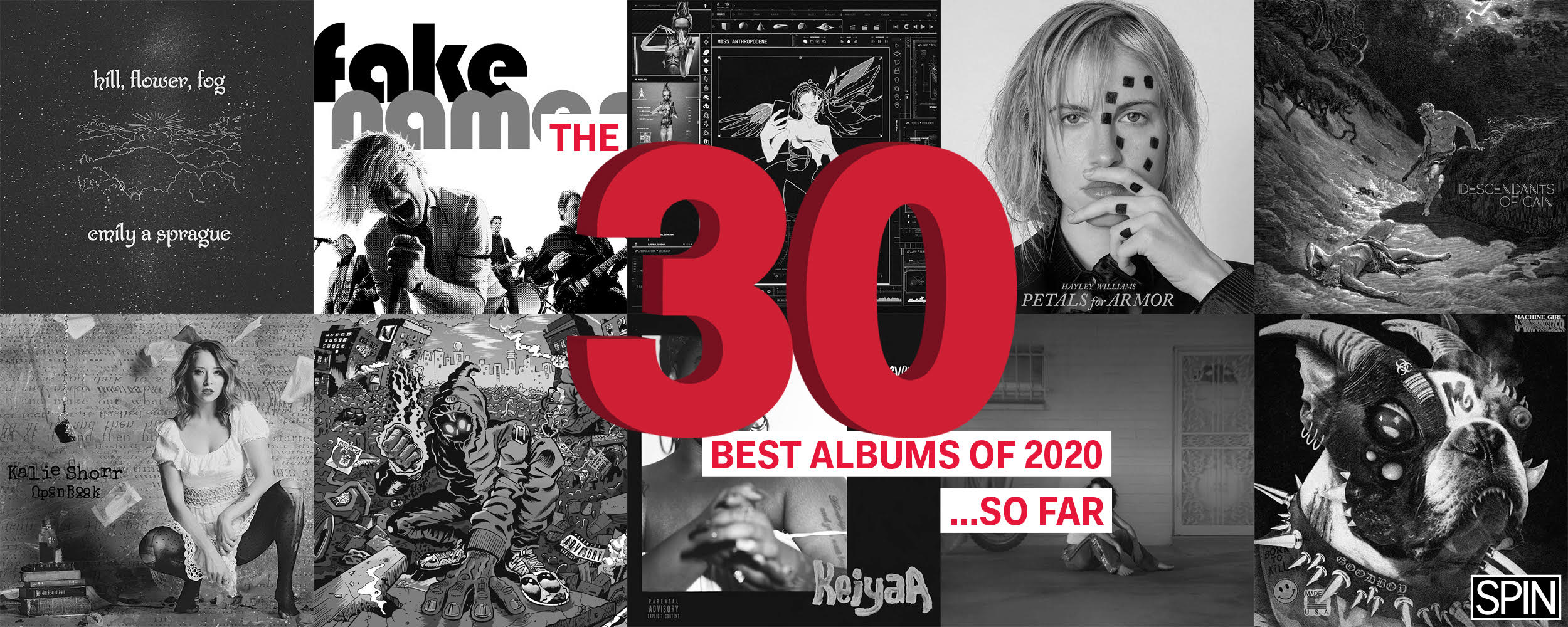Princess Nokia, Everything Is Beautiful/Everything Sucks (Platoon)
The horrorcore on Everything Sucks is more like seasonal-Halloween-store-core, which is just perfect for Destiny Frasqueri’s Korn impression on “Crazy House” (“mmm…da da da boom dah”) and boasts like “I am grosser than you hoes and it shows.” Never undervalue a rapper who gleefully tries on costumes like she’s playing Nicki in the high-school musical version of Kanye West’s “Monster” video, though that hardly means the equally excellent, happy-place flipside Everything Is Beautiful is any more the “real” Princess Nokia. Never undervalue a rapper who repeats the “fuck these cops” line 3x or makes a beat from dialing someone’s landline either. And when she talks about family, she tells, in detail, how good they’re eating. — D.W.
Serengeti, AJAI (Cohn Corporation)
David Cohn’s catalog is filled with narratives of obsession. He invents characters with real desires, grudges, and regrets; complexities so overwhelming they require albums to explore. Kenny Dennis, the nasal and mustachioed Chicagoan whom Serengeti is most well-known for portraying, has an ax to grind with Shaq (yep, that one) and a wife (deceased as of Serengeti’s album Dennis 6e) who casts a shadow over every facet of his life. AJAI, the newest chapter in rap’s greatest serial, finds Kenny crossing paths with the title character, a young Indian man consumed with purchasing rare sneakers and premium streetwear collabs, sometimes to the detriment of his marriage. Produced by Kenny Segal (billy woods, Hemlock Ernst), whose somber beats bump around organic textures and live instruments, AJAI is so much more than a commentary on consumerism. It’s about broken men and the obsessions that move them — and it may be the richest narrative you hear in music all year. — M.B.
Kalie Shorr, Open Book (Kalianne Frances Shorr)
Country is so far back in Taylor Swift’s rearview that she’s left a vacancy for some time now in the twang/spunk/massive-chorus continuum. But what if someone came along who did that even better? Maine-to-Nashville 25-year-old Shorr has a dirtier mouth (don’t buy pills from a “piece of shit named Phil,” kids), trickier power-rock payoffs (“Alice in Wonderland” is the best Cars siphon since “Stacy’s Mom”), and a bigger, brighter guitar attack (“The One” takes Sunny Day Real Estate’s “In Circles” to CMT). All told, her target demo is older than Swift’s ever was, i.e. “I’ve been taking advice from my vices,” “I don’t really like dating assholes / But I do it ’cause I have a weird relationship with my dad.” But if Swift wore engagement rings on her middle finger she would’ve dodged quite a few messes in the first place. — D.W.
Soakie, Soakie (La Vida Es Un Mus Discos)
Hardcore blossomed during Reagan, so it’s hard to imagine what we’d do without its necessary cleanse in the time of Mitch McConnell. This Melbourne/Brooklyn summit updates the medium accordingly; sometimes “I don’t care what you say / I wish you would go away” or “There’s too many fucking boys” is all that need be shrieked. Sometimes warp-speed sarcastic rage for 13 minutes isn’t just the move, it’s a health plan. — D.W.
Soccer Mommy, Color Theory (Loma Vista)
Since the release of her 2018 debut studio album Clean, Soccer Mommy’s Sophie Allison has mastered the art of unraveling herself. With Color Theory, Allison dissects her complex emotions refreshingly, sequencing groups of songs by color: blue for sadness, yellow for mental and physical illness, and gray, for fear of death. There’s the obvious influence of Liz Phair, Allison’s onetime tourmate, as she leans into the raw angst and dream-fuzz guitars of the ‘90s artists before her. But while Clean fixated on young love, Color Theory sees the 22-year-old confronting the harsh realities of growing up — dealing with her mom’s cancer and her artistic rise — while further asserting herself as a skilled songwriter in total command of her creative gifts. — I.K.
The Soft Pink Truth, Shall We Go On Sinning So That Grace May Increase? (Thrill Jockey)
Drew Daniel’s previous outings as the Soft Pink Truth were wild whippet hits with jagged, conceptual edges. There was the sense that we were listening along as this Matmos co-proprietor and provocateur got away with murder. Hoary punk-rock riots could be reinterpreted as prickly house bangers as certainly as black metal chestnuts could be defanged or rewired. (The bizarre, sampladelic Why Pay More? is less discussed, but brilliant in its own odd right.) Comparatively speaking, Shall We Go On Sinning So That Grace May Increase? is the soundtrack to some rave’s well-managed chillout Quonset hut. Voices — not Daniel’s, this time — pipe in and out of dreamy, ambient swirls and sticky 12K-esque pitch shifts. The vibe shifts, almost imperceptibly, from secondhand Soul II Soul to Steve Reich drift to Soulquarian uplift to the Microphones’ cosmic, awestruck Mount Eerie. Nothing clever here; it’s all welcome nourishment. — Raymond Cummings
Emily A. Sprague, Hill, Flower, Fog (self-released)
Modular synthesizer LPs tend to favor endless, excessive drones or piled-up chords. While these courses of action are fine most of the time, there are risks: You tune out or the music scatters you. Hill, Flower, Fog is a coronavirus quarantine album rushed out to prepare us for that very catastrophe; “i hope it helps calm find a way” read the Bandcamp-only album’s notes. It is perfect quarantine listening because Emily A. Sprague plays her instrument with the nimbleness of a dancer stalking crossing a minefield. She seems to be making premeditated tonal choices intuitively and cautiously here, her distinct scales and creamy note-sprays grounding us in themselves. This handful of pastoral reveries are paths for us to follow, away from our devices and the chaos therein, towards the sublime. For a little while, anyway — long enough for pulses to unquicken, and tight jaws to fall slack. — R.C.
Hayley Williams, Petals for Armor (Atlantic)
“Roads,” Doc Brown said to Marty McFly at the end of Back to the Future, “Where we’re going, we don’t need roads.” With Paramore’s frontwoman quickly becoming as iconic as that line herself, it perfectly captures the imagination of the direction-changing, eye-opening, deep-diving triumph of Hayley Williams’ solo debut. On Petals for Armor, the singer turns therapy-induced journaling into a three-act tour de force that first explores rage (the dancey-dark “Simmer”), home observations (the Björk-meets-Beta-Band “Cinnamon”), and shame (“Dead Horse” and its perfect harmonies). Then it takes ’80s R&B for a spin on “Pure Love” and never quite returns. By year’s end, scientists may still be discovering new genres-inside-genres this album tucked in just as easter eggs. — Jolie Lash
X, Alphabetland (Fat Possum)
What’s more punk than dropping one of your best albums in your late 60s, by bringing back your 72-year-old guitarist no less? The last time X and Billy Zoom were together on an album, crack was rampant, Ronald Reagan was president and this publication was two months old. Despite a lapse nearly as long as this writer’s been alive, Alphabetland has the surprise and shock of a Mike Tyson right uppercut. John Doe once again matches the same urgent anxiousness in Exene Cervenka’s lyrics, and they apparently didn’t have to reach far to conjure up old tricks: two onetime throwaways remade into killers (one with sax!), Zoom’s revved-up Chuck Berry riffs like he never left, John and Exene harmonizing damn near every line. Firmly back in this wheelhouse that they call home, why’d they ever leave? — Daniel Kohn
Yaeji, What We Drew (XL)
Cast off the cares of the day and wade slowly into the warm waters of Yaeji’s mood. The NYC songwriter-producer evolves from darling beatmaker to fully realized artist on this album-length mixtape, even taking up painting, design, and animation to flesh out her vision. What We Drew incorporates R&B, drum ‘n’ bass, classic house, jazz, and traditional sounds of South Korea into a muted tapestry of midnight hues. You might even call it pop. — K.B.





